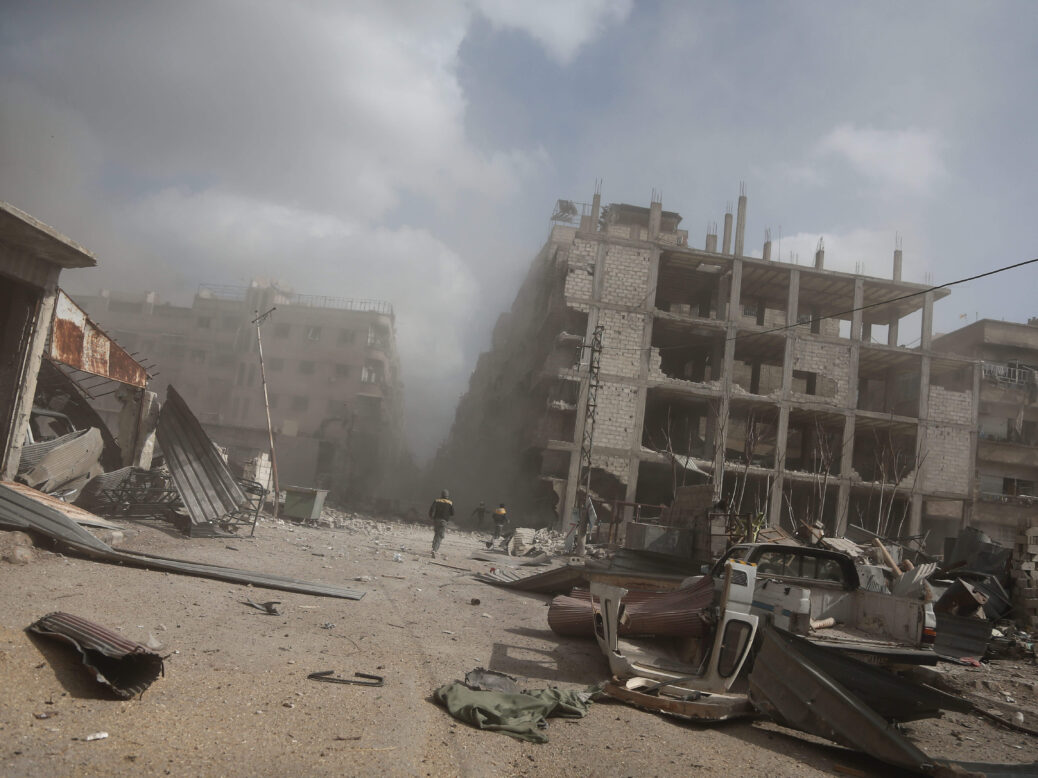
I know Ghouta well. My family was lucky to have a home there. A beautiful, quiet suburb just 10km from Damascus, it was common for families to live there and commute into the big city for work. The area was once known for its intense carpet of fruit trees, vegetables and maize.
Today, though, Ghouta is a scene of grey death. No one in my family lives there anymore – it’s too dangerous. Damascenes can hear the planes as they wing their way to drop bombs on the area. And for those still trapped in eastern Ghouta, life is hell on earth.
Eastern Ghouta is the last rebel stronghold near the capital, and the Assad regime is bombing the area without mercy. Bashar al-Assad lost control of eastern Ghouta to rebel forces in 2012, and since then Syria’s Moscow-backed government has continued to bombard the 400,000 people located there, half of whom are children under 18. Buildings collapse, children are crushed, and many have been displaced or killed. This devastation is in line with the regime’s scorched earth policy, which includes hospitals and civilians in its target range.
If this were not enough, Assad has imposed a heavy siege on the area, blocking any medical supplies and food from reaching those in need. There is no food, no shelter, no water and no electricity. The UN World Food Program said in a report last year that people there are so malnourished they are forced to eat garbage.
Despite the prolonged human suffering, violence is continuing to escalate. In early February, the regime heightened their military campaign against Eastern Ghouta with airstrikes that have killed hundreds. In the past week alone, Médecins Sans Frontières estimates that more than 500 people have died. Heavy shelling has been accompanied by the grotesque use of chemical warfare. There are reports that chlorine gas was used in attacks just last week, targeting not only houses but hospitals and medical facilities, children and the sick. This is sadly not the first time Assad’s use of chemical warfare on civilians has sparked international outcry. In August 2013, civilians in Ghouta were the victim of a horrific chemical attack, in which sarin gas was used to asphyxiate over one thousand people.
The ceasefire agreed on Saturday is therefore welcome. But after so many years of war, Syrians like me are treating it with caution. Russia has agreed to the ceasefire on its own terms, which means it is likely that violence will continue. The five-hour truce will hopefully allow aid in, but still leaves 19 hours a day for Russia to continue killing civilians. We must also not forget that Eastern Ghouta was part of a deal agreed by Russia, Iran and Turkey to introduce “de-escalation zones” in order for aid to reach civilians. The deal was soon broken by the regime.
What makes this worse is that Assad is trying to fool the world into believing that these attacks are both necessary and just. He argues his bombs are needed to defeat terrorists hiding in the region. But this claim ignores the fact that women and children have been targeted. By using this excuse, the regime also undermines international efforts to end violence in Syria under the auspices of the United Nations. Assad argues that only his violence can defeat terrorists; real terrorists like Daesh argue that only their violence can defeat Assad. The Syrian civilians trapped in the middle deserve better.
The images of death on our news channels are hard to look at, but they are important. By forcing ourselves to look, we show Syrians that the world has not given up on them.
Indeed, Syrians now need actions, not anger. The world community must continue to apply pressure on Assad’s allies like Russia to stop these atrocities and respect international resolutions. As an international community, we must also hold the regime and its backers responsible for their use of chemical warfare. There can be no future for Syria with this brutal dictator still in power.
Perhaps most importantly, we cannot allow our anger to detract from a commitment towards what must remain Syria’s ultimate goal – democracy, dignity and a future for our children. As we approach the anniversary of seven years of civil war we must remind ourselves that this all started with a simple and peaceful protest calling for democracy. That is why it is the responsibility of all of us to campaign for a democratic future where Syrians are free from Assad and free from terrorism. As long as there is hope that one day life in Syria will be both free and peaceful, there is hope for Syria.
Bahia Mardini is a journalist and human rights campaigner. She was an information media consultant in the National Coalition for Syrian Revolutionary and Opposition Forces, and was the director of the media office of the opposition delegation in the peace negotiations in Geneva 2012. Since fleeing her home in Syria, she is now based in the UK, where she is a founder of Syrian House, an organisation dedicated to helping Syrians in the UK access information and support.





